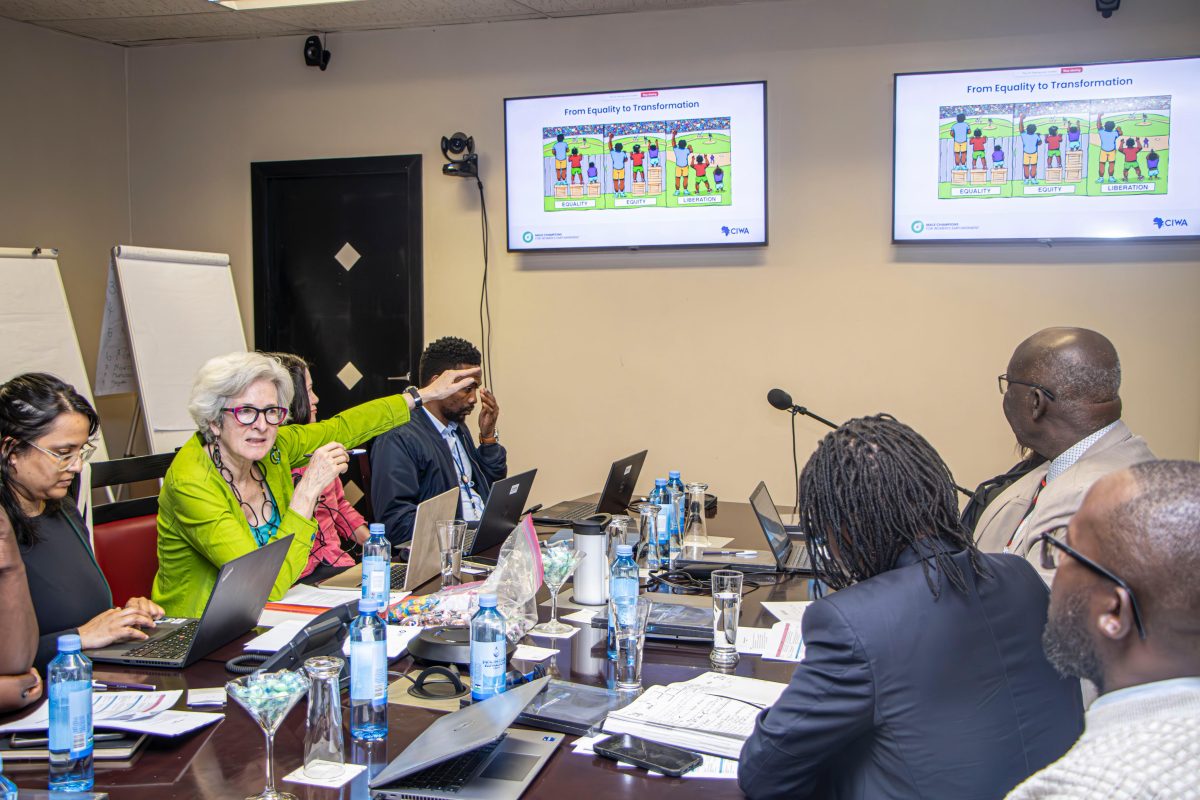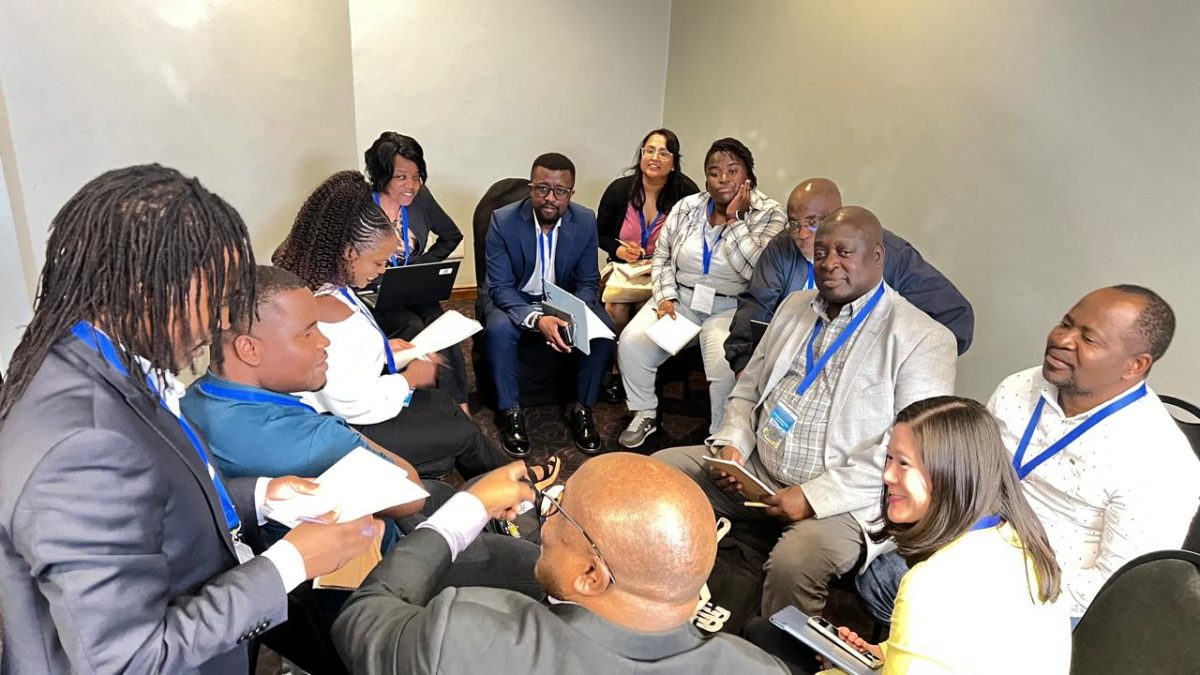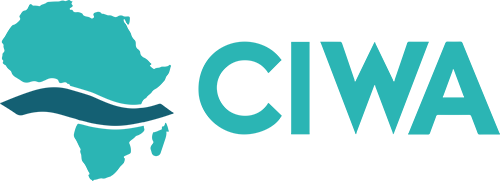Empowering Women: CIWA Male Champions Unite in Lesotho
Posted in : Blog on 18 December 2024

Identify actions Male Champions can take to promote women’s empowerment at the continental, regional, national and local level. Credit: Paballo Makatla/ CIWA Program
The Cooperation for International Waters in Africa (CIWA) is committed to promoting gender equality in transboundary water management. It supports women by addressing institutional and programmatic challenges that hinder their participation. Despite positive outcomes from direct support, CIWA acknowledges that entrenched patriarchal norms still limit women’s influence in decision-making. To address this, CIWA has initiated the Male Champions for Women’s Empowerment (MCWE) program, which engages men who advocate for gender equality to help combat gender inequalities and foster positive change for women in the water sector.
Concretely, the MCWE kicked off with a one-day virtual meeting in June 2023. This was by monthly meetings where Male Champions shared experiences and provided input to fellow Male Champions about strategies to overcome obstacles preventing women’s empowerment. The virtual meetings have also served as a basis to identify and plan for action, including preparing a draft action plan. In September 2024, MCWE co-hosted a successful online learning event with Women in Water Development Network (WWDN). Aside from the benefits of forging a strategic partnership with WWDN, Male Champions saw the event as critical to guiding their future actions. In particular, they were able to hear directly from women coming from 40 countries involved in the water sector about the challenges they face operating in a male-dominated environment.
A Learning Event that gathers Male Champions for the first time in a face-to-face meeting
Building upon the success of this online forum, MCWE hosted a side event on October 30th, the first day of the 25th WaterNet Symposium in Maseru, Lesotho. More than 40 participants came together to learn more about the MCWE and to guide its future work. Participants were organized into four small groups where they shared their perspectives on the key reasons women are excluded from active participation in decision making and leadership processes. The event culminated in small groups examining these challenges to identify possible actions that would be appropriate for Male Champions to take. As facilitators for each small group session, the Male Champions then presented the results from the small group sessions to plenary.
Reflecting on the outcomes of both learning events, Male Champion Buyani Fakudze observed: “I think the side event was fantastic and went better than expected. I received a lot of exciting feedback and left with the motivation to keep going. Overall, I think the webinar and the side event brought a certain kind of energy that revitalized the Male Champion group”. Both learning events also aimed to recruit new Male Champions, resulting in the expansion of the MCWE platform from 8 participants at the launch to an active force of 22 Male Champions today.

A Learning Event that gathers Male Champions for the first time in a face-to-face meeting. Photo Credit: Paballo Makatla/ CIWA Program
CIWA’s decision to unite Male Champions at the Waternet Symposium was motivated by a desire to energize the Male Champions and forge stronger bonds for collective engagement. A key component was hosting a face-to-face meeting on October 29th on the fringes of the Symposium. The morning sessions were designed to lay the foundation for Male Champions to identify common interests and approaches to their roles. While the MCWE had developed a draft action plan during the pilot phase, the meeting placed a strong emphasis on reviewing and validating actions and expected results. The afternoon sessions therefore focused on planning concrete actions and establishing indicators to measure the results of MCWE actions. According to Chris Juma, another Male Champion, “The October 29th meeting provided an opportunity to align and to speak the same language.”
Identify actions Male Champions can take to promote women’s empowerment at the continental, regional, national and local level
Aside from re-energizing and re-focusing this platform, the MCWE now has clear actions to take over the short and longer term. These actions include preparing individual pledges to guide their commitment to the promotion of women’s empowerment, developing a code of ethics and organizing more learning events. To ensure they have sufficient understanding of gender equality and its application within their own work context, Male Champions will participate in a one-day online training workshop in the new year. Some individual Male Champions such as Assefa Gudina from ENTRO, are currently planning for CIWA’s Gender and Social Inclusion Expert to travel to Nairobi to provide training and support the launch of a Gender Equality Platform.
It is safe to say that both the side event and the face-to-face meeting surpassed their objectives. As part of the debrief of the overall experience, Male Champion Dr. Pinnie Sithole noted: “We have been meeting virtually over the past year including discussing a draft action plan. However, I believe it was necessary to meet face-to-face to validate the action plan. As a result of the face-to-face meeting, I left with a clear road map and a list of priority actions that should be undertaken in the short and medium term.”
Learn more
Resources
AFTER ACTION REPORT FROM THE EXPERIENCE EXCHANGE SEMINAR: HOW CAN MEN SUPPORT THE CHALLENGES WOMEN FACE IN TRANSBOUNDARY WATER INSTITUTIONS?
BLOGS
MARCH 2023
AUGUST 2023
NOVEMBER 2023
MARCH 2024
JULY 2024
OCTOBER 2024
https://www.ciwaprogram.org/blog/how-can-men-intentionally-stand-up-for-women/


